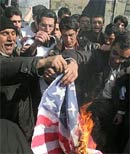|
|
|
UN nuclear chief: Iran has refused to halt enrichment
International |
2007/02/22 09:00
|
| Iran has expanded its uranium enrichment program instead of complying with a UN Security Council ultimatum to freeze it, the UN nuclear watchdog agency said Thursday. The finding clears the path for harsher Security Council sanctions against Teheran. "Iran has not suspended its enrichment-related activities," said the International Atomic Energy Agency, basing its information on material available to it as of Saturday. The conclusion - while widely expected - was important because it could serve as the trigger for the council to start deliberating on new sanctions meant to punish Teheran for its nuclear intransigence. In a report written by IAEA Director General Mohamed ElBaradei, the agency also said that the Islamic republic continues construction of a reactor that will use heavy water and a heavy water production plant - also in defiance of the Security Council. Both enriched uranium and plutonium produced by heavy water reactors can produce the fissile material used in nuclear warheads. Iran denies such intentions, saying it needs the heavy water reactor to produce radioactive isotopes for medical and other peaceful purposes and enrichment to generate energy. The six-page report obtained by The Associated Press also said that agency experts remain "unable ... to make further progress in its efforts to verify fully the past development of Iran's nuclear program" due to lack of Iranian cooperation. That, too, put it in violation of the Security Council, which on Dec. 23 told Teheran to "provide such access and cooperation as the agency requests to be able to verify ... all outstanding issues" within 60 days. |
|
|
|
|
|
|
Class action or a representative action is a form of lawsuit in which a large group of people collectively bring a claim to court and/or in which a class of defendants is being sued. This form of collective lawsuit originated in the United States and is still predominantly a U.S. phenomenon, at least the U.S. variant of it. In the United States federal courts, class actions are governed by Federal Rules of Civil Procedure Rule. Since 1938, many states have adopted rules similar to the FRCP. However, some states like California have civil procedure systems which deviate significantly from the federal rules; the California Codes provide for four separate types of class actions. As a result, there are two separate treatises devoted solely to the complex topic of California class actions. Some states, such as Virginia, do not provide for any class actions, while others, such as New York, limit the types of claims that may be brought as class actions. They can construct your law firm a brand new website and help you redesign your existing law firm site to secure your place in the internet. |
Law Firm Directory
|
|





